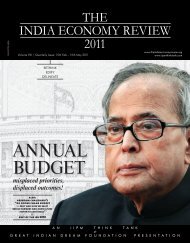Download - The India Economy Review
Download - The India Economy Review
Download - The India Economy Review
You also want an ePaper? Increase the reach of your titles
YUMPU automatically turns print PDFs into web optimized ePapers that Google loves.
nomic order. In his infl uential 1920 article,<br />
Economic Calculation in the Socialist<br />
Commonwealth, Mises wrote that ‘in the<br />
socialist commonwealth every economic<br />
change becomes an undertaking whose<br />
success can be neither appraised in advance<br />
nor later retrospectively determined.<br />
<strong>The</strong>re is only groping in the dark.<br />
Socialism is the abolition of rational<br />
economy.’ 13 <strong>The</strong> debate that Mises initiated,<br />
and one that Hayek carried forward,<br />
was one of pitting liberalism against socialism,<br />
and in this debate the importance<br />
of economic planning was a central one.<br />
Economic Planning and<br />
Sharpening of the Debates<br />
<strong>The</strong> debates that were carried out on economic<br />
planning and centralized planning<br />
in the perspective of market<br />
processes held up important lessons<br />
for those that would be interested<br />
in these formulations.<br />
<strong>The</strong> debates were not just onesided.<br />
It turns out that these were<br />
subjected to critical assessments. In<br />
this context Boettke points out that the<br />
‘intellectual biases of the time failed to<br />
appreciate not only the economic problems<br />
of planning, but ignored political<br />
diffi culties of planning.’ 14 Economic planning,<br />
in other words, could work insulated<br />
from political processes even if centralization<br />
of such planning was opted for. <strong>The</strong><br />
formats of the political aspects opted for<br />
were muted ones indeed. Keynes, who<br />
would propose governmental role in economic<br />
planning in signifi cant measures,<br />
wrote to Hayek stating that, ‘I should<br />
therefore conclude your theme differently.<br />
I should say that what we want is not<br />
no planning, or even less planning, indeed<br />
I should say that we almost certainly want<br />
more. But planning should take place in a<br />
community in which as many people as<br />
possible, both leaders and followers,<br />
wholly share your own moral position.<br />
Moderate planning will be safe if those<br />
carrying it out are rightly oriented in their<br />
own minds and hearts to the moral<br />
issues.’ 15 Keeping with this approach,<br />
Keynes proposed that, ‘What we need<br />
therefore, in my opinion, is not a change<br />
in our economic programmes…..what we<br />
need is the restoration of right moral<br />
thinking – a return to proper moral values<br />
in our social philosophy.’ 16 This was in<br />
response to the ‘moral rule’ that Hayek<br />
had referred to in the context of who<br />
would carry out economic planning for the<br />
economy. Keynes, one can read into this,<br />
I NTEGRATED PLANNING<br />
was in favour of a pattern where centralized<br />
planning would be carried on by the<br />
political structure and aided for the purpose<br />
by benevolent civil employees responsible<br />
for such planning. <strong>The</strong> orientation<br />
of those in charge of carrying out<br />
centralized planning required being morally<br />
correct and when this was so it could<br />
be expected that the planning confi gure<br />
would be able to realize goals set for society.<br />
Keynes who was an active participant<br />
in matters related to governmental activities<br />
and aware of the trends that did take<br />
place in the societal context did however<br />
add something more in his correspondence<br />
with Hayek. ‘Dangerous acts’, Keynes<br />
wrote, can be done safely in a<br />
community which thinks and feels<br />
rightly, which would be the<br />
way to hell if they were executed<br />
by those who think and<br />
feel wrongly.’ 17 This, Friedman<br />
points out, is an expression<br />
of Keynes’s ‘bequest to politics’. 18 <strong>The</strong> half<br />
way format, in a manner of speaking, was<br />
an allusion to the relationship of the State<br />
and economic planning.<br />
Economic planning could work<br />
insulated from political processes<br />
even if centralization was opted for<br />
This was not all, and other economists,<br />
concerned with the approach towards<br />
economic planning outlined by Hayek and<br />
Mises, debated that the move towards<br />
centralized planning was not a handicapped<br />
road to take. And nor did they<br />
agree that economic planning would lead<br />
to the emergence of an authoritarian political<br />
regime. Rebutting Hayek on the<br />
approach that he had adopted as regards<br />
political implication of centralized plan-<br />
THE INDIA ECONOMY REVIEW<br />
39





